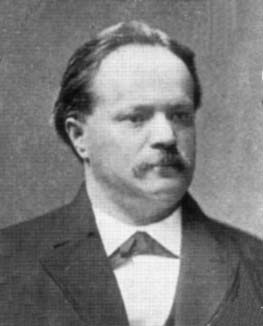
Lazarus Immanuel Fuchs
 المؤلف:
J H Manheim
المؤلف:
J H Manheim
 المصدر:
Biography in Dictionary of Scientific Biography
المصدر:
Biography in Dictionary of Scientific Biography
 الجزء والصفحة:
...
الجزء والصفحة:
...
 19-12-2016
19-12-2016
 769
769
Born: 5 May 1833 in Moschin (near Posen), Prussia (now Poznań, Poland)
Died: 26 April 1902 in Berlin, Germany

Lazarus Fuchs attended the Friedrich Wilhelm Gymnasium in Berlin where his remarkable abilities at mathematics became very clear to his teachers while he was still young. Mathematics became the subject which, even at this early stage, Fuchs knew was going to dominate the rest of his life.
After leaving the Gymnasium, he studied at the University of Berlin where he attended lectures by a number of famous mathematicians including Kummer and Weierstrass. Most significantly it was Weierstrass who introduced Fuchs to function theory and who went on to supervise his doctorate. The examiners for his doctoral dissertation were Kummer and Martin Ohm (the brother of Georg Simon Ohm) and Fuchs was awarded the degree by the University of Berlin 1858.
After obtaining his doctorate, Fuchs was appointed to a teaching post at a Gymnasium. From there he moved on to a mathematics teaching position at Friedrich Werderschen Trade School. During this time he was undertaking research with the aim of becoming a university professor. He began his university teaching career when he was appointed as a Privatdozen at the University of Berlin 1865. He was promoted to extraordinary professor there in 1866 and taught at the University until winter semester 1868-69 when he accepted an appointment at Greifswald. Fuchs also held a second post in Berlin from 1867 when he was appointed as professor of mathematics at the Artillery and Engineering School.
After spending five years in Greifswald he moved again, this time to Göttingen in 1874. Then in the following year he went to Heidelberg and taught there for nine years. In 1884 he returned to Berlin to fill Kummer's chair when his old teacher retired. Fuchs held this post for the rest of his life. He also undertook important editorial duties in the final ten years of his life when he was the editor of Crelle's journal, the Journal für die reine und angewandte Mathematik.
Fuchs worked on differential equations and the theory of functions. In [1] Manheim writes:-
Fuchs was a gifted analyst whose works form a bridge between the fundamental researches od Cauchy, Riemann, Abel, and Gauss and the modern theory of differential equations discovered by Poincaré, Painlevé, and Émile Picard.
In 1865 Fuchs studied nth order linear ordinary differential equations with complex functions as coefficients. This is described by Bölling in [2]:-
Fuchs enriched the theory of linear differential equations with fundamental results. He discussed problems of the following kind: What conditions must be placed on the coefficients of a differential equation so that all solutions have prescribed proberties (e.g. to be regular or algebraic). This led him(1865, 1866) to introduce an important class of linear differential equations (and systems) in the complex domain with analytic coeffivcients, a class which today bears hios name (Fuchaian equations, equations of the Fuchsian class). ... He succeeded in characterising those differential equations the solutions of which have no essential singularity in the extended complex plane. Fuchs later also studied non-linear fifferential equations and moveable singularities.
Fuchs' study (1876 with Hermite) of elliptic integrals as a function of a parameter marks an important step towards the theory of modular functions (Klein, Dedekind). In a series of papers (1880-81) Fuchs studied functions obtained by inverting the integrals of solutions to a second-order linear differential equation in a manner generalising Jacobi's inversion problem.
It was Fuchs' work on this inverse function which led Poincaré to introduce what he called a Fuchsian group, and use this as a fundamental concept in the development of the theory of automorphic functions. Fuchs also investigated how to find the matrix connecting two systems of solutions of differential equations near two different points. A survey of Fuchs work appears in [3] where Gray also describes how this work influenced Klein, Jordan, Poincaré and others. In this interesting paper Gray also discusses the relationships between Fuchs' ideas and his mathematical tools, and illustrates how solutions of some problems led Fuchs to the study of further problems.
In [2] Bölling describes Fuchs' character as follows:-
... Fuchs is a representative of both Berlin's classical and its post-classical era. His personality has been described as indecisive, timid, but at the same time humorous and full of kindness.
- J H Manheim, Biography in Dictionary of Scientific Biography (New York 1970-1990).
http://www.encyclopedia.com/doc/1G2-2830901542.html
Articles:
- R Bölling, Weierstrass and some members of his circle: Kavalevskaia, Fuchs, Schwarz, Schottky, in Mathematics in Berlin (Berlin, 1998), 71-82.
- J J Gray, Fuchs and the Theory of Differential Equations, Bull. Amer. Math. Soc. (N.S.) 10 (1) (1984), 1-26.
- J J Gray, Erratum: 'Fuchs and the theory of differential equations', Bull. Amer. Math. Soc. (N.S.) 12 (1) (1985), 182.
- E J Wilczynski, Obituary of Lazarus Immanuel Fuchs, Bull. Amer. Math. Soc. 9 (1902), 46-49.
 الاكثر قراءة في 1830to1839
الاكثر قراءة في 1830to1839
 اخر الاخبار
اخر الاخبار
اخبار العتبة العباسية المقدسة


